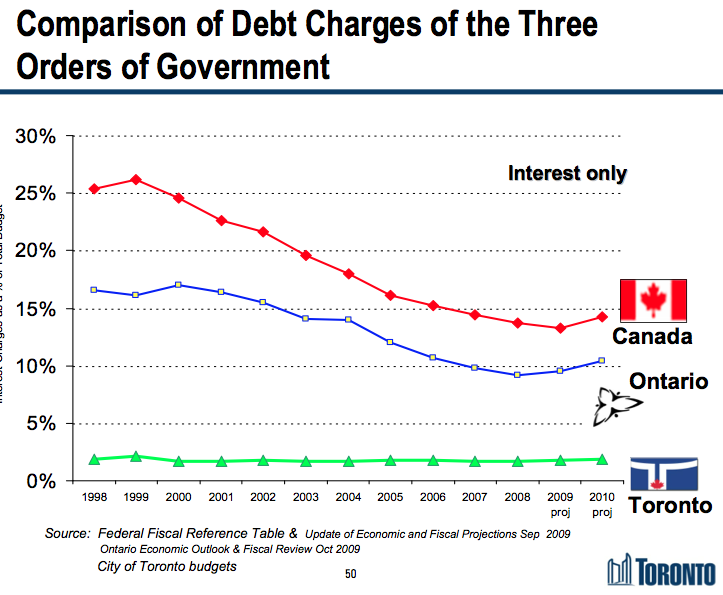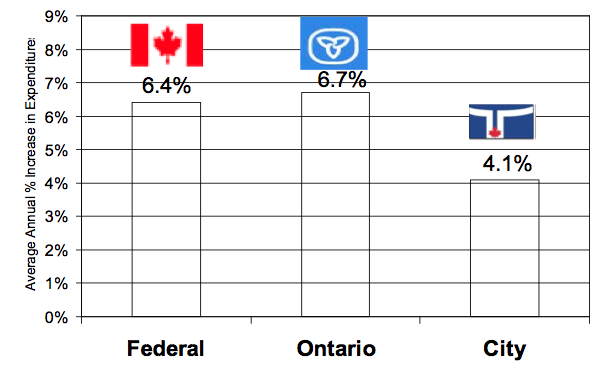In part two of my look at the raw data from the City’s Core Service Review survey — since dismissed as irrelevant by members of Rob Ford’s executive committee — I take a look at issues relating to the city’s thoroughfares, which includes bikes, roads and sidewalks. Before you read this, you may want to go back and read the previous instalment on transit.
Respondent 2-505 is a 65-year-old cycling advocate who “who couldn’t ride a bike to save my life.” Responding to the City of Toronto survey which served as the opening salvo in the still-continuing Core Service Review process, the senior writes, “from what I can see out my window every day, bikes make sense and cars don’t.”
“Cyclists know the routes and the neighbourhoods they traverse,” the response continues. “But people in cars just can’t WAIT to get somewhere.The more encouragement Toronto gives to cycling — the better.”
“Bike Lanes — this will make everything better.”
Our 65-year-old cycling-advocate-who-does-not-cycle serves as a good indication of the overwhelming message behind the raw data report, which was put together using a crude keyword search by City staff: the people who responded to this survey are passionate about the need for better cycling infrastructure in this city. Of the 154 pages included in this specific report — which primarily deals with “roads, sidewalks & traffic services” and not specifically cycling –, a call for more bike lanes appears on approximately 108 of them.
Most responses are short. 1-520 writes that the “City is too car-centric and doesn’t have enough bike lanes or pedestrian areas.” 1-28 says we “need to add bike lanes on major roads.” 2-47 writes, “Mr. Ford may hate cycling for some bizarre reason, but the fact is that gas prices are rising, more people are poor, and they still need to get around.”
2-314 is even more blunt. “Bike lanes,” they say. “This will make everything better.” Some are willing to shout about the issue, like 4-181, who tells us what we need: “BIKE LANES BIKE LANES BIKE LANES BIKE LANES!!!!! BIKE LANES! – you must implement them.”
“License bikes, or get rid of bike lanes.”
There is, of course, a minority voice that seems strongly opposed to cycling infrastructure. Respondent 2-450 implores the city to “please ban bicycle rides during rush hours, they are putting everyone in danger.” 2-405 believes that our problem is that we have “too many unused bike lanes, especially in winter — bike lanes should be seasonal.” 2-319 calls cyclists “psychotic” where 2-8 is a bit more reasonable, rationalizing that “we don’t need any more bike lanes in Etobicoke or Scarborough, just as much as we don’t need big box stores in the downtown core.”
There’s a small contingent voices in the responses beating the drum for a bicycle licensing system. 4-196 suggests that we “Have all cyclists pay registration fee and have a license so traffic violations can be enforced.”
On traffic: “This city is choking on itself.”
I’ll make two observations on the overarching attitude toward traffic — and by that I mostly mean automobile — congestion in this city. The first is that damn near everyone feels like it is a major problem that needs to be addressed immediately. The second is that some are very reluctant to embrace the obvious solutions to the problem, which would include things like road pricing and infrastructure for alternative forms of transportation.
Respondent 1-47 calls for “more efficient roads.” 2-37 points out that “Our geography and climate demand the use of automobiles,” and so “we should be more tolerant and prepared for the increasing number of vehicles on the roads.” Some respondents are overly fixated on the traffic conditions on one specific roadway, with people naming congestion on the Don Valley Expressway, the Gardiner Expressway, Kingston Road and the Allen Expressway as their top priorities facing this city.
2-434 is a blunt as can be: “Keep traffic flowing — WITHOUT TOLLS.”
Making Jane Jacobs roll over a few times, more highways are actually proposed: 2-84 says there are a “lack of highways” in Toronto. 2-323 calls for a “second expressway” like the DVP on the west side of the city, connecting Highway 400 with downtown. 4-145 says extending the Allen Expressway to the Gardiner — that is, reviving the Spadina Expressway project — would “rejuvenate traffic movement.” 2-378 wants the City to explore either making all lanes flow in one direction on the DVP during rush hour. Either that, or “building UP, and having a two tiered roadway.”
“Driving is a privilege, not a right — treat it as such.”
![]() By my estimation, there is a strong support for road pricing throughout the responses. 4-65 says it’s time for “Toll Roads! Toll Roads! Toll Roads!” 1-1218 suggests that “to help alleviate the problems … consider bringing in tolls on DVP and other major roads.” 1-441 also links the solution to traffic congestion with toll roads, asking if it’s “time for some sort of user pays fee?”
By my estimation, there is a strong support for road pricing throughout the responses. 4-65 says it’s time for “Toll Roads! Toll Roads! Toll Roads!” 1-1218 suggests that “to help alleviate the problems … consider bringing in tolls on DVP and other major roads.” 1-441 also links the solution to traffic congestion with toll roads, asking if it’s “time for some sort of user pays fee?”
If there’s a strong ideological divide within the document, it’s not presented as a battle between those who support road pricing and those who absolutely oppose it. The latter is a fringe minority. What would seem to divide people instead is whether we should institute road pricing for all users or just for drivers who don’t live and pay taxes in Toronto.
2-418 sums up that view: “905 citizens are not contributing to the city even though they use our roads, GO, etc. They should be paying road tolls to help the city maintain good quality roads.”
“A parking ticket should not be $30 – this is too high.”
Issues relating to parking — and the lack of it, and how expensive it is — were the only thing to give me pause when I first reviewed this report. People are passionate about their parking. While some advocate rising parking fees, putting a tax on all parking spots, or selling the Toronto Parking Authority, many are convinced the city has a major parking problem.
Respondent 1-1375 names “expensive parking costs” as one of the most important issues facing our city. 1-1447 says we need “more publicly funding parking spaces” and “less privately owned ones.” 1-1506 says we must “decrease fees for public parking!” Respondent 2-304 calls the city’s current parking enforcement nothing but “legalized theft”, saying that the, “parking authority is out of control. This has nothing to do with parking and everything to do with legally looting people.”
“You talk of roads. What about the pedestrians?”
Pedestrians are the often overlooked and underrepresented user of Toronto’s roadways, but they do chime in here. 3-90 says we must “be friendly to pedestrians, make their lives better!”
In addition, there is widespread agreement that the city must get its act together when it comes to the coordination of road work. 1-237 says that one of the biggest challenges the city is facing is a “shabby public realm with no coordination of utility work and sidewalk/street repair.” Hundreds of other responses echo that sentiment.
But some, of course, have more specific concerns. States 1-520: “There is way too much dog shit on Toronto sidewalks.”
I think we can all agree with that sentiment too.


